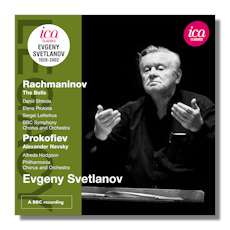
The Internet's Premier Classical Music Source
Related Links
-
Prokofieff Reviews
Rachmaninoff Reviews - Latest Reviews
- More Reviews
-
By Composer
-
Collections
DVD & Blu-ray
Books
Concert Reviews
Articles/Interviews
Software
Audio
Search Amazon
Recommended Links
Site News
 CD Review
CD Review
Evgeny Svetlanov

(1928-2002)
- Sergei Rachmaninoff: The Bells, Op. 35
- Serge Prokofieff: Alexander Nevsky, Op. 78 *
Elena Prokina, soprano
* Alfreda Hodgson, mezzo soprano
Daniil Shtoda, tenor
Sergei Leiferkus, baritone
BBC Symphony Chorus and Orchestra/Evgeny Svetlanov
* Philharmonia Chorus and Orchestra/Evgeny Svetlanov
Recorded Live at Barbican Hall, London – April 19, 2002
* Recorded Live at Royal Festival Hall – January 30, 1988
ICA Classics ICAC5069 79m
These live performances document the considerable talent of the Russian conductor Evgeny Svetlanov, a man who had a fair number of detractors during his career, but also a good many supporters. The Rachmaninov concert is an important historic event for those interested in Svetlanov, because it was his last concert. He died two weeks later.
The Bells, touted by many as Rachmaninov's greatest work (a viewpoint hard to challenge), gets an intense and powerful reading from Svetlanov. It has less rawness than Kondrashin's very excellent early-stereo recording on Melodiya. Indeed, the Svetlanov features a very chipper first movement (The Silver Sleigh Bells) and quite a lush second movement (The Mellow Wedding Bells). Not surprisingly, Svetlanov imparts intensity and darkness to the last two movements (The Loud Alarm Bells and The Mournful Iron Bells). That said, Svetlanov is less bleak in the finale than is customary, and makes you wonder whether the conductor, who had to know his days were numbered at the time, was searching out some sort of hope in this death-obsessed music.
A couple of years ago I reviewed the Serebrier-led performance of The Bells on Warner Classics and found it quite effective. That recording was also derived from a live concert and featured the same baritone Sergei Leiferkus, who sings splendidly on both recordings. The sound on this ICA Classics CD, from a decade ago, is quite vivid though there is some audience noise. So the Svetlanov account of The Bells gets a pretty strong thumbs up.
The coupling is, of course, Prokofiev's popular cantata Alexander Nevsky. Again the performance is very compelling, though The Battle on the Ice features some nervous brass playing. Alfreda Hodgson turns in fine singing in The Field of the Dead and overall I would say this recording is as good as Svetlanov's studio recording for Melodiya from the 1960s, an effort I always liked. Here, despite some imperfections in The Battle on the Ice, that movement is utterly thrilling as Svetlanov imparts a grimness and power to the buildup and a real sense of triumph later on. There are of course many other fine Nevskys, including those of Ormandy (RCA), Järvi (Chandos), Previn (Telarc and EMI) and Abbado (DG). Svetlanov's effort has very good sound for its time, though it is a bit bright. Still, because it is miked closely with good balances, you hear much detail in the scoring that is often buried in other recordings.
To admirers of Svetlanov, this recording is a must. Others who might be interested in these two masterpieces will find both performances compelling and worth their while.
Copyright © 2012, Robert Cummings




















